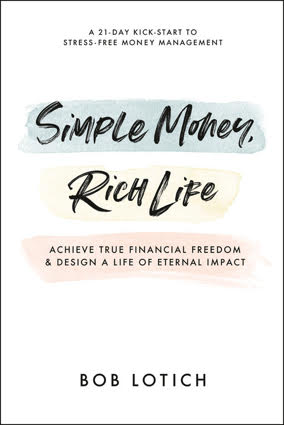5 Practical Strategies to Handle Inflation

In 2021, U.S. Treasury Secretary Janet Yellen predicted that the high inflation would be temporary. On Tuesday, in an interview, she admitted, "I was wrong about the path inflation would take." She went on to explain, "There have been unanticipated and large shocks to the economy that have boosted energy and food prices and supply bottlenecks that have affected our economy badly that at the time I didn't fully understand."
And according to the Bureau of Labor Statistics latest CPI report, the stuff we buy every day is 8.3% more expensive than it was 12 months ago. Within that average, some items have seen a tremendous average price increase in the last year:
- Gasoline is up 43%.
- Food is up 11%.
- Used cars are 23%.
- Electricity is up 11%.
So, if your personal finances feel tighter, you aren't crazy; they probably are. And many suspect inflation rates may continue to go even higher in the months to come. While inflation is something that few of any ability to control, it makes sense to focus on the things that we can control so we can better handle this difficult financial situation that we all are affected by.
With that, here are five practical strategies to handle high inflation.
1. Stock Up on Items You Regularly Use
Buying items that you know you will use in the year(s) to come (at today's prices) is one of the simplest ways to fight back. Think of it like this. If food prices continue to rise and are 11% higher in a year from now, then any foods you buy now with a long shelf-life will be like buying at an 11% discount from 2023 prices. So if you have a deep freezer or a large pantry, you can easily stock up at today's prices rather than the prices of 3, 6, or 12 months from now.
And if you combine this strategy with buying on-sale items (i.e., buying ground beef during a 20% off sale), you can amplify your savings.
So think about all the items you regularly and consistently use and consider stocking up if possible. This could be any type of food with a decent shelf life like pasta, canned goods, rice, or other pre-packaged items. But also consider all the household items you consistently use like soaps, shampoos, toothpaste, batteries, or even toilet paper (just in case there is a repeat of 2020).
2. Know Exactly Where Your Money Is Going

This should go without saying, but I'll say it anyway. If you don't know exactly how much you are spending on food, household items, and entertainment each month, then you are probably spending more than you realize.
This is why it is so important to know and pay attention to where you are spending. When you know exactly how much you are spending on X each month, you can quickly and easily identify problem spots and then fix them.
One common problem spot is unused subscriptions. According to Chase 71% of Americans waste over $600/year on subscription services they aren't even using. This doesn't even account for subscriptions they aren't aware of. One simple way to do this is by using a personal finance app like Personal Capital or Mint that will allow you to see where you have been spending for the last few months. Again, without seeing exactly where your money is going, it's hard to identify leaks.
3. Store Less in Savings Accounts
Yes, saving money is still good advice for times like these. But with average savings rates still below 1% and an inflation rate of 8+%, it is important to consider where you are putting your money.
You would never sign up for a savings account that had a negative 7% interest rate, right? Well, that is essentially what is happening in our savings accounts right now (i.e., ~1% savings rate - ~8% average inflation rate = ~7%). Sure, your actual savings balance isn't being reduced by 7% each year, but your spending power (how far your dollars go) is being reduced by about an average of 7% at the moment.
While having some cash set aside for emergencies is still a good idea in an inflationary environment like we are in today, you definitely don't want too much cash sitting in a savings account.
Instead, consider TIPS or I-Bonds which are government-backed bonds that keep pace with inflation. For example, at the time of this writing, you can buy a series I Bond that is currently paying 9.62%, which is ten times more than even the best savings account rate right now.
4. Reduce Your Fuel Expense

It's no secret that gas prices are painfully high right now. So, focusing a little energy on reducing your fuel usage can have a significant impact on active drivers.
One of the best gas saving tips is to stop driving aggressively. Automotive company Edmunds did a study that revealed that just eliminating aggressive driving reduced fuel consumption by an average of 31%. That's like reducing your price per gallon from $4.50 to $3.10. With a 31% reduction, the savings can quickly add up.
According to Edmunds, "If you slowed your 0-to-60-mph acceleration time down from your current 10 seconds to a more normal city pace of 15 seconds, you'll feel the savings immediately."
Additionally, using an app like GasBuddy, you can find the cheapest gas stations in your area. A quick search using the app revealed a 30 cents per gallon difference between two nearby gas stations. So next time you have to fill up the tank, a tool like this can help save you a good bit of money.
5. Remember: God Is Still on the Throne
The truth that we must never forget in times like these is that God is still on the throne, and even though our earthly economy may be shaken, God's economy is as strong as ever. He is still our source, so even if our salary isn't keeping pace with inflation, God is the one who is responsible for taking care of our needs, and He will always do a better job than you and I ever could.
And when I find myself in the position of fearfully clinging to the money-draining in my account or frustrated with the prices of gas and groceries, I always sense Him gently reminding me that He is my source and my trust needs to be in Him.
Also, we are at our best when we remember that Philippians 4:19 has always been and will always be true: "My God shall supply all your need according to His riches in glory by Christ Jesus."
So, do yourself a favor and write this down and meditate on it day and night until peace comes. It's likely going to be a while until we see the typical 2-3% average inflation rates again, and living through record-breaking inflation is difficult at best. But these five tips will help you minimize the hit to your personal finances.

By his 20s, Bob Lotich was overwhelmed by debt, stranded 1,000 miles from home, and had only $7 to his name. After crying out to God for wisdom, he discovered a biblically-inspired formula that helped him reach a level of financial freedom he had never dreamed possible. Through the simple methods within this formula, he paid off his house by age 31 and even reached a personal goal of giving $1 million by age 40. Bob Lotich began sharing his inspirational financial journey online, becoming an award-winning blogger and podcast host of SeedTime Money. For the last 14 years, he has been a trusted voice for Christians wanting to find financial freedom the way God intended
Now, in his casual and approachable style, Bob (along with his fun-loving wife, Linda) shares everything he has learned about achieving true financial freedom in Simple Money, Rich Life: Achieve True Financial Freedom and Design a Life of Eternal Impact (WaterBrook, on-sale 4/26/22). This hope-filled money guide will help Christians increase savings, earnings, and giving—and actually enjoy it all—while designing a life of freedom and eternal impact.

Originally published September 06, 2024.





